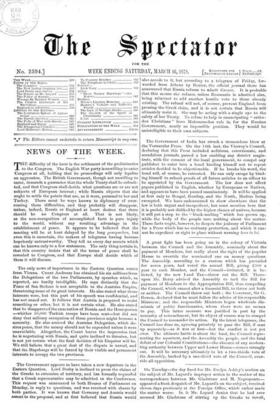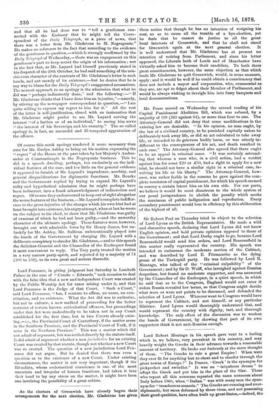On Tuesday—the day fixed for Mr. Evelyn Ashley's motion on
the subject of Mr. Layard's improper action in the matter of the correspondence between Mr. Gladstone and M. Negroponte- appeared a fresh despatch of Mr. Layard's on the subject, received eleven days previously at the Foreign Office, which rather made the matter worse. In it Mr. Layard denies that he had ever accused Mr. Gladstone of stirring up the Greeks to revolt,
and that all he had done was to "tell a gentleman con- nected with the Embassy that he might tell the Corre- spondent of the Daily Telegraph, as a piece of news, that there was a letter from Mr. Gladstone to M. Negroponte." He makes no reference to the fact that according to the evidence of the gentleman in question,—which is strongly reaffirmed by the Daily Telegraph of Wednesday,—there was an engagement on this gentleman's part to keep secret the origin of his information ; nor to the fact that, as Mr. Layard had himself previously stated in his despatch of the 29th October, he had said something of the mis- chievous character of the contents of Mr. Gladstone's letter in such hands, and not merely of its existence,—but he denies that he is any way to blame for the Daily Telegraph's exaggerated accusations. The nearest approach to an apology is the admission that what he did was "perhaps indiscreetly done," and the following :—" If Mr. Gladstone thinks that I have done him an injustice,"—namely, by stirring up the newspaper correspondent in question,—" I am quite willing to express my regret to him for it." All the rest of the letter is self-justification, closed with an insinuation that Mr. Gladstone might prefer to see Mr. Layard serving the interest "of a faction or of an individual," to seeing him serve "the interest of his Sovereign and his country." The so-called apology is, in fact, an uncandid and ill-tempered aggravation of the offence.



































 Previous page
Previous page